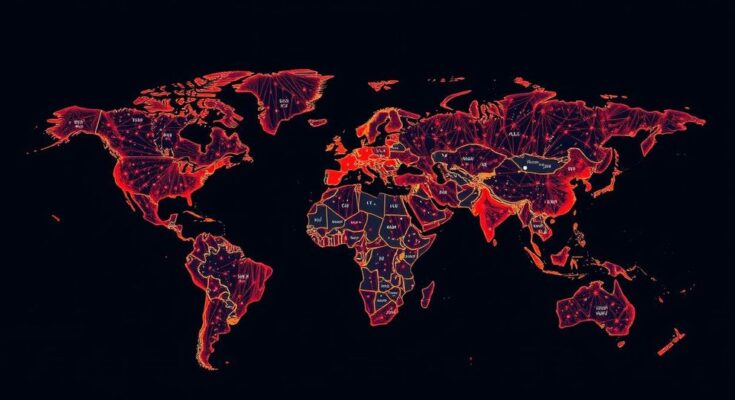Typhoon Toraji is hitting the Philippines’ northeastern Aurora province, prompting evacuations and cancelations of services due to its projected destructive path across Luzon. President Ferdinand Marcos Jr. is managing recovery efforts from recent storms, while local officials urge safety measures as the nation braces for the impact. The military is on standby to assist, as aid from other countries helps support affected communities.
Typhoon Toraji made landfall in northeastern Aurora province, carrying sustained winds of 130 kilometers per hour and gusts reaching 180 kilometers per hour. The typhoon is expected to traverse the mountainous Luzon region, where President Ferdinand Marcos Jr. recently assessed the damages caused by prior storms. In an effort to manage recovery from consecutive weather disturbances, he opted out of attending this week’s Asia-Pacific Cooperation forum in Peru.
Interior Secretary Jonvic Remulla has mandated the evacuation of 2,500 villages projected to be impacted by Typhoon Toraji, referred to locally as Nika. He highlighted the susceptibility of the already rain-soaked mountains, valleys, and plains to flash floods and landslides. “We understand if some would want to stay, but we have to get them out,” Remulla stated, emphasizing the urgency of moving people to safety.
In response to the impending disaster, the military has activated disaster response units in high-risk areas and suspended combat drills in northern regions. The commitment to protect citizens during disasters remains strong, as articulated by Armed Forces of the Philippines Spokesperson, Colonel Francel Margareth Padilla.
In preparation for the typhoon, schools, inter-island ferries, and domestic flights in affected provinces have been halted. This marks the 14th significant weather disturbance in the Philippines this year. Experts are also monitoring another potential storm brewing in the Pacific that could further impact the archipelago.
The previous storms and a tropical cyclone have caused substantial devastation, resulting in over 160 fatalities, damage to thousands of properties, and dislocation of more than 9 million individuals, including many who sought refuge in emergency shelters. The Philippine government is also receiving substantial assistance from neighboring Southeast Asian nations, particularly Singapore, and the United States to help provide essential supplies to severely affected areas.
The Philippines is highly susceptible to typhoons due to its geographical location, which places it in a cyclone-prone area of the Pacific. As a result, the nation frequently faces severe weather conditions that can lead to significant natural disasters. The government routinely prepares for such events by implementing evacuation protocols and overcoming challenges associated with disaster response, particularly after enduring severe impacts from multiple recent storms that have left millions affected and infrastructure severely damaged.
In summary, Typhoon Toraji poses a significant threat as it impacts northeastern Luzon, triggering evacuations and halting essential services. The swift response by government officials and military forces underscores the urgency to protect citizens from potential disasters. Moreover, with ongoing international assistance, communities are striving to recover from the devastating consequences of prior storms. The preparedness for subsequent potential storms remains a priority as authorities continue to monitor weather developments in the Pacific.
Original Source: www.mid-day.com




